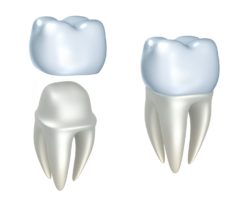If your tooth has sustained major structural damage, your dentist will likely suggest treatment with a dental crown. This fixture resembles a ceramic cap that fits over an affected tooth and seals into place with dental cement.
The crown has multiple uses and provides optimal and long-lasting improvement to oral health. You can feel more confident undergoing this treatment when you know the specifics of the benefits this fixture offers. Read on to find four ways that dental crowns can improve the health of a damaged tooth.



4 Advantages of Dental Crowns
Restore Weakened Tooth Enamel
Your teeth have a hard outer layer called enamel. This enamel protects the vulnerable interior of your tooth, withstanding wear and tear on a regular basis. But enamel is not indestructible.
Over time, plaque and certain foods can cause enamel to erode, weakening the tooth. You might feel tooth sensitivity pain and have a higher risk of contracting dental problems. Your enamel cannot regrow on its own, but your dentist can use restorative dental solutions to construct a replacement.
A dental crown covers a damaged tooth, serving as a substitute for thinned enamel. It can remain in place with dental cement for fifteen or more years.
Repair Broken Tooth
As mentioned, your teeth are strong and can bear a great deal of pressure. But accidents can occur that generate too much pressure and cause your teeth to chip, fracture, or crack.
This injury breaks the barrier and can allow bacteria and plaque to enter the tooth. It also disrupts the appearance of your smile. You should seek prompt treatment to repair your tooth after this injury. A dental crown will restore the structure of the tooth and rebuild the seal to keep the tooth safe from further harm.
Brighten Discolored Tooth
Dental crowns are known for their restorative benefits, but they can help improve the look of your smile too. Dentists create crowns on a customized basis for each patient, meaning they factor in the unique size, shape, and color that will give them a natural and gorgeous finish to their smile.
For this reason, a patient can meet their smile aesthetic goals with a crown as well. A dentist can cover a stained or otherwise discolored tooth with a crown to whiten the color and give the patient the smile of their dreams.
Protect Tooth After Restorative Treatment
A dental crown offers effective treatment on its own. But they also serve as beneficial tools alongside other dental work. For instance, a crown can serve as a prosthetic tooth that attaches to the top of an implant, replacing a single lost tooth.
Dentists will also use a dental crown to shield and protect a tooth after drilling away advanced tooth decay. The crown covers a larger area than a dental filling can for optimal preservation.
A dentist will employ a dental crown to cover a tooth after undergoing root canal therapy. It keeps the tooth looking its best while sealing the vulnerable tooth from further damage after removing its diseased pulp.
